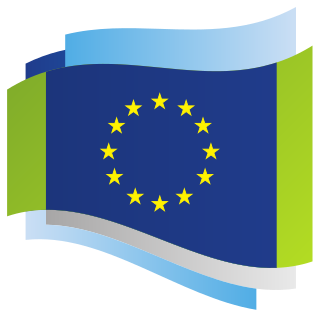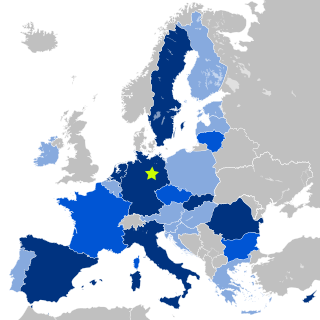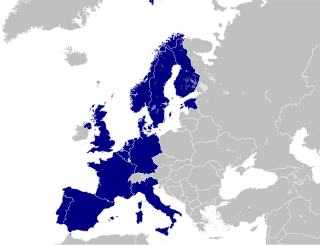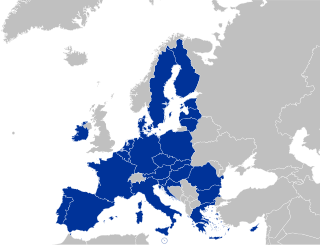
The European Corps (Eurocorps) is an intergovernmental military corps of approximately 1,000 soldiers stationed in Strasbourg, Alsace, France. The corps had its headquarters established in May 1992, activated in October 1993 and declared operational in 1995. The nucleus of the force is the Franco-German Brigade established in 1987. The Treaty of Strasbourg, signed in 2004, gave the corps its formal legal basis when it entered into force on 26 February 2009.

The European Gendarmerie Force is an operational, pre-organised, robust, and rapidly deployable, exclusively comprising elements of police forces with military status of the Parties, in order to perform all police tasks within the scope of crisis management operations. Art.1 of the Treaty establishing the European Gendarmerie Force.

The Common Security and Defence Policy (CSDP) is the European Union's (EU) course of action in the fields of defence and crisis management, and a main component of the EU's Common Foreign and Security Policy (CFSP).

The European Defence Agency (EDA) is an agency of the European Union (EU) that promotes and facilitates integration between member states within the EU's Common Security and Defence Policy (CSDP). The EDA is headed by the High Representative (HR/VP), and reports to the Council. The EDA was established on 12 July 2004 and is based in Brussels, Belgium.

In the European Union (EU), enhanced cooperation is a procedure where a minimum of nine EU member states are allowed to establish advanced integration or cooperation in an area within EU structures but without the other members being involved. As of October 2017 this procedure is being used in the fields of divorce law, patents, property regimes of international couples, and European Public Prosecutor and is approved for the field of a financial transaction tax.

The European Maritime Force is a non-standing, military force with the current participation of France, Italy, Portugal and Spain. The force may carry out naval, air and amphibious operations, with an activation time of 5 days after an order is received.
The European Air Transport Command (EATC) is the command centre that exercises the operational control of the majority of the aerial refueling capabilities and military transport fleets of a consortium of seven European Union (EU) member states. As of January 2015, the combined fleet under the authority of the EATC represents 75% of the European air transport capacity. Located at Eindhoven Airbase in the Netherlands, the command also bears a limited responsibility for exercises, aircrew training and the harmonisation of relevant national air transport regulations.

The European Medical Command (EMC) is a planned medical command centre in support of the military operations of the European Union, as part of the Permanent Structured Cooperation (PESCO).

European Secure Software-defined Radio (ESSOR) is a planned European Union (EU) Permanent Structured Cooperation project for the development of common technologies for European military software defined radio systems, to guarantee the interoperability and security of voice and data communications between EU forces in joint operations, on a variety of platforms.

Military Mobility is one of the initial projects launched under the European Union's (EU) Permanent Structured Cooperation in Defence (PESCO) facility. It is commonly termed a "Military Schengen" as it is inspired by the EU's Schengen Area, but designated to aid the free movement of military units and assets throughout Europe via removal of bureaucratic barriers and improvement of infrastructure.

The Coordinated Annual Review on Defence (CARD) is a process of monitoring the defence plans of European Union (EU) member states to help coordinate spending and identify possible collaborative projects. It has operated on a test basis since 2017 under the European Defence Agency (EDA), in cooperation with the European External Action Service (EEAS). The first full implementation of CARD will be in the autumn of 2019.

This article outlines the history of the Common Security and Defence Policy (CSDP) of the European Union (EU), a part of the Common Foreign and Security Policy (CFSP).
This articles outlines the defence forces of the European Union (EU), which implement the EU's Common Security and Defence Policy (CSDP) in CSDP missions. There are two categories of EU multinational forces: ones that have been established intergovernmentally and made available to the CSDP through article 42.3 of the Treaty on European Union (TEU), such as the Eurocorps; and the EU Battlegroups, established at the EU level.

The European Personnel Recovery Centre (EPRC) is an intergovernmental military organisation that contributes to the development and harmonisation of policies and standards related to personnel recovery. The ERPC also provides support for education, training, exercises and operations. The EPRC was established on 8 July 2015 and is based at Poggio Renatico Air Base in Italy.

The European Intervention Initiative (E2I) is a joint military project between 10 European countries outside of existing structures, such as the North Atlantic Treaty Organization (NATO) and the European Union's (EU) defence arm. E2I is planned to operate a "light" permanent secretariat based on the network of military liaison officers with the French defence ministry.
The Joint European Union Intelligence School (JEIS) is a project of the Permanent Structured Cooperation (PESCO) that was announced in November 2018. The project will be led by Cyprus and Greece. The school will provide education and training in intelligence disciplines, among other things, to EU member states intelligence personnel, and develop new hardware, including drones and electronic warfare technology.













